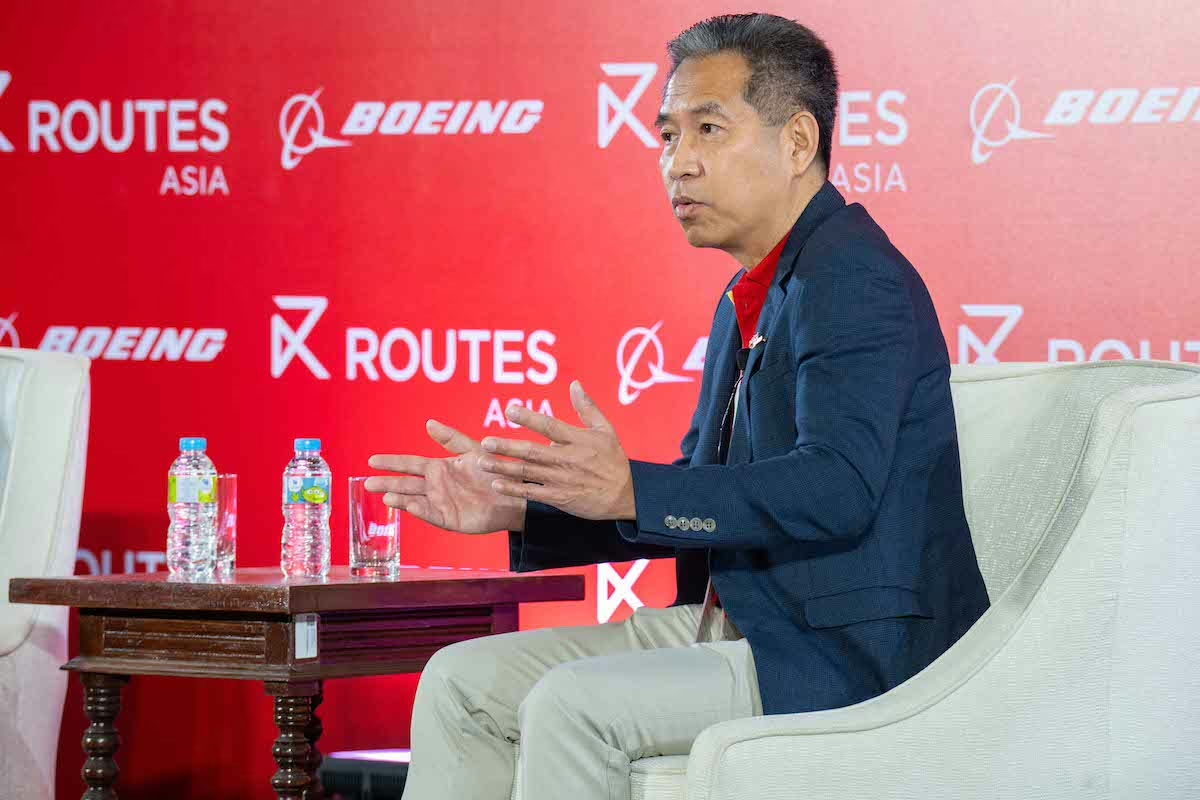
Thai Vietjet CEO Woranate Laprabang speaking at Routes Asia 2023.
CHIANG MAI, Thailand—Emerging from the pandemic, Thai Vietjet is planning to shift its center of gravity from domestic to international operations and more than triple its total international available seat kilometers (ASK).
The LCC is preparing to receive its first of 50 Boeing 737-8 aircraft in July 2024 and is set to become an all-Boeing operator by 2027.
Speaking at Routes Asia 2023, Thai Vietjet CEO Woranate Laprabang said that prior to the pandemic the LCC primarily focused on charter flights to China. Once COVID-19 struck, the airline rejigged itself to operate to domestic destinations during the course of the 2020-22 period.
Woranate joined the carrier in July 2020, having prior experience at Thai Airways, where he also helped to set up Thai Airways subsidiary Thai Smile.
With strong demand, Thai Vietjet’s domestic market share rose from 6th to 2nd, and experienced double revenue growth in 2022. Woranate expects its 2023 revenue to continue to double from 2022 as the market picks up.
By the end of 2023, the total international ASK will expand to 35%, with average stage length also reaching 1.3 hours to 1 hour. Woranate explained that by flying internationally, Thai Vietjet can increase the average aircraft utilization rate by around 4 hr.—as overnight flights are restricted in Thailand—which will in turn reduce the unit cost per aircraft.
China will be the primary market of focus in 2023, but international services are also targeted within the Association of Southeast Asia Nations (ASEAN), India and North Asia.
Thai Vietjet will launch a 3X-weekly Chiang Mai-Osaka route from Feb. 16, which will be the first nonstop service from Chiang Mai to Japan in around 15 years.
However, Woranate said the LCC would be "humble" and manage its expansion within ASEAN, first focusing on the Indochina region before looking south in markets like Indonesia where other competitors already have a strong foothold.
He stressed that the biggest stumbling block is its limited capacity. Thai Vietjet currently operates 11 Airbus A320-family aircraft, which will expand to 18 aircraft all sub-leased from Vietnam’s Vietjet Air. He said that the used aircraft market is currently very active, with lease rates increasing by 20-25%.
The 50 737-8s bound for Thai Vietjet are part of Vietjet’s 200-aircraft order. Woranate said the airline must manage the burden of capital expenditure during the course of the re-fleeting process as it must invest in pilot and technical retraining and reequipping.
Nonetheless, the CEO welcomed the new aircraft that will provide better range and fuel efficiency, reaching new destinations such as Perth and northern Japan, which are out of range for the airline's A321s.
Woranate said that despite a smaller pool of 737 pilots in the region, there are still "hundreds" of pilot cadets in Thailand coming upstream. Until that cohort expands, the airline will need to particularly focus on offering competitive pilot renumeration.
Being a Vietjet affiliate, Woranate said Thai Vietjet shares sales and marketing resources and has benefited from the strong Vietjet brand, helping it to more easily enter new markets, but the CEO stressed that the airlines are run independently, both financially and operationally. He also said that as high utilization of aircraft is a priority, there are no plans to enter any codeshare agreements and adjust flight timings to match connecting passengers. Thai Vietjet announced partnership with virtual interline service with Dohop in September 2022, allowing passengers to book tickets with Singaporean LCC Scoot and potentially more carriers once its international network expands.
Editor's note: This story has been updated to reflect that Thai Vietjet will receive its first Boeing 737-8 aircraft in July 2024 and is set to become an all-Boeing operator by 2027.
